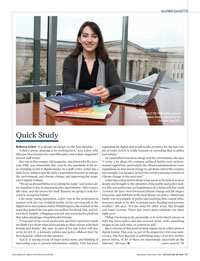Alumni Gazette
 FROM CT TO TNR: Leber, once at the Campus Times, now writes for The New Republic. (Photo: Paul Morigi/AP Images for Rochester Review)
FROM CT TO TNR: Leber, once at the Campus Times, now writes for The New Republic. (Photo: Paul Morigi/AP Images for Rochester Review)Rebecca Leber ’11 is already an old pro at The New Republic.
“I find it pretty amazing to be working here,” says Leber, who this past June became the venerable policy and culture magazine’s newest staff writer.
Her rise at the century-old magazine, also known by the acronym TNR, was remarkably fast, even by the standards of the ever-changing world of digital media. As a staff writer, Leber has a dual focus: subject-specific policy journalism focused on energy, the environment, and climate change; and improving the magazine’s digital content.
“We are so pleased Rebecca is joining the team,” said senior editor Jonathan Cohn, in announcing her appointment. “She’s smart, she cares, and she knows her stuff. Readers are going to look forward to seeing her byline.”
Like many young journalists, Leber rose in the profession in tandem with the rise of digital media. At her previous job at the digital news and opinion outlet ThinkProgress, she worked on the team that helped the site gain one million Facebook fans, and edited their Tumblr, a blogging network and social media platform that takes advantage of multimedia formats.
“I was part of the social media unit, and that experience made me think a lot about what drives people to share stories with their friends and family,” she says. As part of her job, Leber will also write for Q.E.D., a domestic politics and policy offshoot that The New Republic rolled out this summer.
“Q.E.D. is staying on top of major policy news, and thinking of interesting ways to present information visually. TNR has been expanding its digital and social media presence for the last couple of years. Q.E.D. is really focused on extending that to policy journalism.”
As a journalist focused on energy and the environment, she says, “I write a lot about the constant political battles over environmental regulations, particularly the Obama administration’s new regulations on how much energy we get from coal in this country. Increasingly, I’m focused on how the world is moving forward on climate change in the next year.”
Leber has a clear notion about what needs to be looked at more deeply and brought to the attention of the public and policy makers. She says politicians are beginning to do a better job, but could “connect the dots” more between climate change and the impact it has now, and will have in the near future, on policy. “Hurricane Sandy was an example of politicians realizing that coastal infrastructure needs to be able to sustain more flooding and extreme weather,” she says. “It’s the same for other areas, like drought and water scarcity. There just aren’t great solutions out there right now.”
“What I’m trying to do, personally, is to write timely pieces on both big news topics and less-covered areas—with something unique to say each time, or context to add.”
She’s convinced that good writing stands out in either print or digital format. This year, as part of the magazine’s 100-year anniversary, The New Republic is publishing many of its best archive pieces online. “A lot of those are surprisingly successful on the Internet,” she says.
–John Martin ’69

